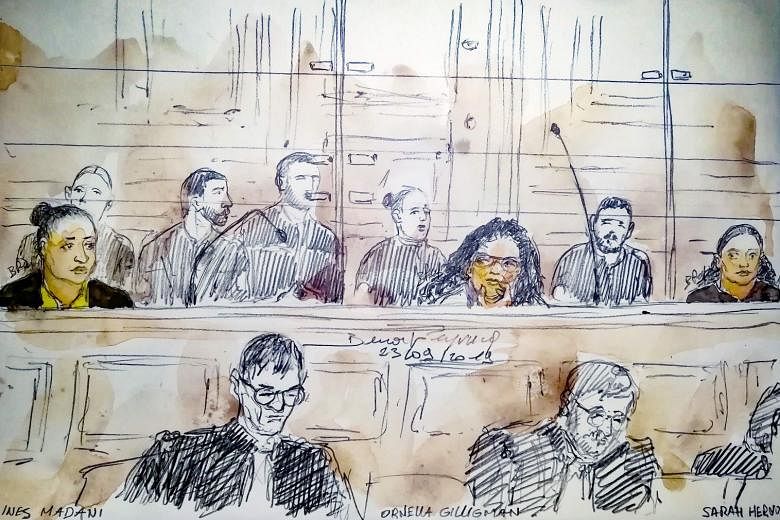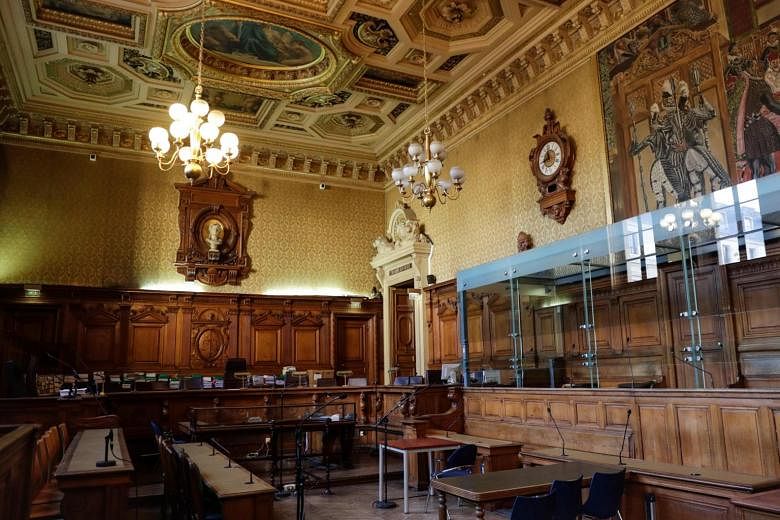PARIS (NYTIMES) - The two women sat side by side in the courtroom over the past three weeks, each blaming the other for what they had done, and both expressing shame and regret over what they had become, "The face of female jihad" in France, according to a state prosecutor.
On Monday (Oct 14), judges sentenced Inès Madani and Ornella Gilligmann to 30 and 25 years of prison, ending a symbolic trial that involved six women and shed a light on the role of female Islamists in homegrown terrorism.
Madani and Gilligmann were accused of trying to ignite a car loaded with gas cylinders near the Notre Dame cathedral in September 2016 in order to carry out an attack in the name of the Islamic State in Iraq and Syria (ISIS).
Judges followed the prosecutors' requests that the women be sentenced to 25 and 30 years each, a sign that a newly appointed terrorism court would take a hard stance on trying radicalised individuals. They had both faced life sentences at the beginning of the trial.
Asked if they had wanted to kill "as many people as possible", Madani, now 22, replied, "At that time, yes, that was the goal".
Before the court gave its verdict on Monday, both expressed deep regret.
"I had the worst behaviour," said Madani, who said she felt ashamed by what she had done.
"I apologise and I will apologise all my life to all those who have been victims of terrorism," Gilligmann said.
The discovery of the car in the waning days of the summer of 2016 shocked France, which had been scarred by a series of attacks in the previous months.
Since then, the country had half-forgotten about the terrorist threat from within, but it abruptly reawakened to it this month with an attack at the Paris Police Headquarters that left four officers dead.
Yet in the courtrooms, a new phase has begun: Hundreds of suspects, including dozens of women, have faced judges.
The "gas canisters trial" was the first major case of a new terrorism court made up of professional magistrates without a jury.
Madani and Gilligmann also stood out as defendants: No other woman had come so close to carrying out an attack in France.
"Women were mostly seen as having a supporting role to male jihadists," said Mr Jean-Charles Brisard, director of the Paris-based Centre for the Analysis of Terrorism.
The attempted attack near Notre Dame changed that, he said.
"Then authorities realised that women could also be in the front line by plotting, planning and carrying out a terrorist attack on French soil," he said.
In the early hours of Sept 4, 2016, Madani and Gilligmann parked a car they had soaked with diesel fuel and loaded with six gas cylinders.
On the Rue de la Bûcherie, a small paved street on the Left Bank of the Seine, the Petit Pont restaurant and its terrace were still open, with 60 people inside.
Their deadly plan was guided by an influential ISIS propagandist, Rachid Kassim, who had been in touch with Gilligmann.
He had suggested placing gas canisters in a car as a way to carry out an attack.
The explosion of the cylinders, which contained gas, would have caused "carnage", investigative judges said. But the would-be attackers used a barely flammable substance and never ignited the car.
Kassim, who earlier that summer had inspired the killings of a police officer and his wife and of a priest, is believed to have been killed in a drone strike near Mosul, Iraq, in 2017.
But with no proof of his death, he was also on trial in absentia.
The case also bore an unnerving twist that riveted the court: Madani, who was 19 in 2016, seduced Gilligmann, then a 29-year-old radicalised mother of three, by posing as a male ISIS fighter. When the two met for the first time, Madani said she was the fighter's sister.
Throughout the trial, Gilligmann claimed she was not responsible for the attempted attack, saying she had struggled to understand how she had fallen in love with a man invented by the soft-spoken woman sitting next to her.
At her parents' home in a working-class Parisian suburb, Madani was a self-effacing teenager suffering from depression who had become radicalised under the influence of an older friend. She never followed through on plans to go to Syria.
On social media and messaging platforms, though, Madani was Abou Junaid, or Abou Soulayman, using various Arabic pseudonyms to pose as a fearless ISIS fighter who had returned from Syria to recruit young men for attacks in France.
In 2016, she turned to women who were sympathetic to ISIS, interacting with at least 12, according to court files.
After she approached Gilligmann over religious quizzes on the livestreaming app Periscope, the two sent each other thousands of messages over three months, developing an intense virtual relationship.
When they spoke by phone, Madani modified her voice. She sent pictures of her stepbrother to make her claims more credible; she also ordered underwear for Gilligmann, who sent back intimate pictures.
"I was blinded; I would only think about Abou, Abou, Abou," Gilligmann told the court.
She said she had wanted to divorce her husband and marry Madani's fake persona.
Madani found the omnipotence exhilarating, said one psychiatrist who examined her.
Another warned judges against the "simplistic view" that one woman had been the puppeteer of the other.
The two women met in person at a fast-food restaurant near Paris a couple of days before the attempted attack, Madani posing as Abou Soulayman's sister.
Their conversation that day was at the heart of the trial: Who suggested the plan for a bombing near Notre Dame?
Madani argued that they vaguely discussed an attack. She later said that she wanted to "die as a martyr" by staying in the car, but that Gilligmann had discouraged her from doing so.
Gilligmann said they had talked only about her "future marriage with Abou" at that first meeting.
She argued that she got involved in the plot against her will, and that she had purposely thwarted it by using diesel fuel.
"She has organised it, we were both there," Madani said on a recent evening. "And we should almost give her a medal for her participation?"
When leaving her home days before the attempted attack, Gilligmann left pictures of her that bore the words "I love you" for her children, as well as a montage of the Eiffel Tower burning.
She was arrested in southern France in early September 2016 as she was fleeing with her family.
Madani was arrested separately that same week during a police operation in a Paris suburb.
She had regrouped with two other women to prepare another attack and was shot in the legs; a police officer later accused her of trying to stab him.
Those two other women also sat in the dock - one of them stabbed a plainclothes officer during the operation and was sentenced to 20 years of prison.
Two other women and a man stood trial over failing to denounce the attempted attacks.
Gilligmann was already in jail when she learned that she had been fooled by Madani.
During the trial, she sometimes struggled to find the right word to refer to Madani - he, or she?
"I am convinced she was in love with me," Gilligmann said.
Madani denied it.
"It was a fool's game," said Dr Daniel Zagury, a psychiatrist who interviewed both women.
"They both fooled each other, and they fooled themselves, too."


